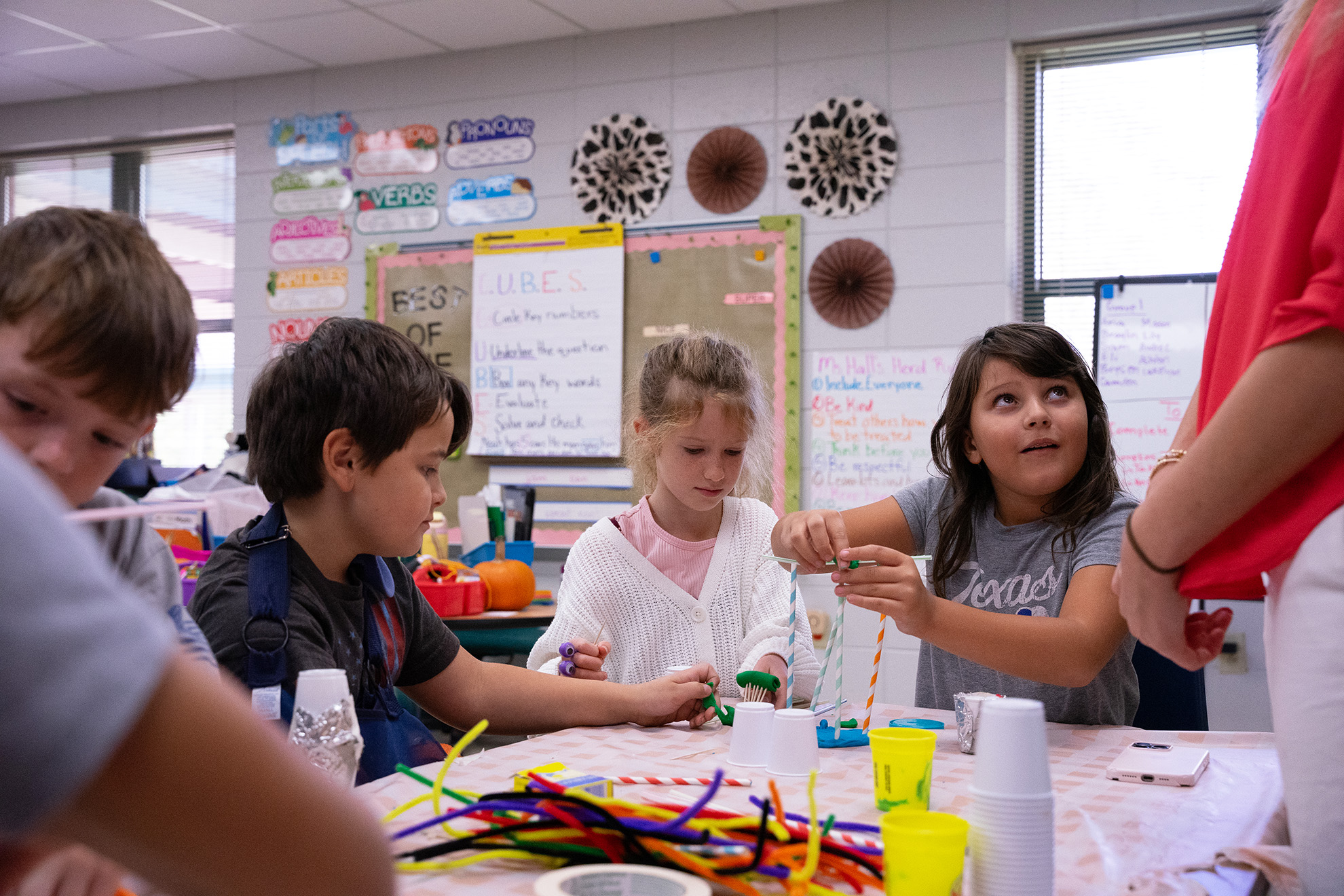-
Academics
- Academics Overview
-
Undergraduate
- Undergraduate Overview
- Agricultural Education
- Early Childhood Education, B.A.
- Elementary Education, B.A.
- Middle Level Education, B.S.
- Mathematics Teaching, B.S.
- Modern Languages Education, B.A.
- Special Education, B.A.
- Secondary Education, B.A.
- Science Teaching, B.S./B.A.
- Athletic Leadership Minor
- Human Capital Education and Development
-
Master's and Specialist Programs
- Master's and Specialist Programs Overview
- Athletic Leadership (Online)
- Counselor Education
- Educational Leadership
- Human Resource Development
- Learning Sciences
- Literacy (Online)
- Middle Level Education, MAT
- Modern Languages, MAT
- Secondary Education, MAT
- Special Education (Online)
- Student Affairs
- Teaching and Learning (Online)
- Teaching and Learning, Ed.S.
- Doctoral Programs
- Certificates | Endorsements | Licensure
- Expressway to Tiger Town
- Bachelor's To Master's | Teacher Residency
- Teaching Fellows
- Research
- Programs
- Students
- About
Center for Innovative Rural Collaborative Leadership Education (CIRCLE)

Center for Innovative Rural Collaborative Leadership Education (CIRCLE)
The College of Education at Clemson University leads the University Council for Educational Administration’s National Center for Innovative Rural Collaborative Leadership Education (CIRCLE) in partnership with East Carolina University, Kansas State University and North Carolina State University. CIRCLE is a research-practice partnership (RPP) that amplifies rural voices, disrupts deficit rural stereotypes through leadership training and disseminates partnership results focused on improving the preparation and practice of educational leaders in rural contexts.
CIRCLE serves as a hub and convenes colleges, universities and school partners to enhance existing regional partnerships and create new UCEA outreach opportunities. Partner institutions lead regional efforts to support coalition building, with the intent to expand to additional Institutional Members over a three-year period. This expansion will reflect the geographic and contextual rurality across the US and engage early CIRCLE partners. There are three pillars of work tied to CIRCLE’s RPP efforts: (1) Practitioner Professional Development, (2) Research and (3) Collaboration for internal and external grants (with a focus on supporting next generation of rural researchers and practitioners).
-
Institutional Members

Clemson University, Clemson, South Carolina. Clemson is deeply engaged with rural areas of SC in over a dozen initiatives covering research, teaching, and service. These initiatives are varied with diverse cooperative agreements that range from RPPs to teacher and school counselor candidate placements. Clemson’s programming in rural areas of SC comes in response to the state’s urgent need to address inequities in rural schools. Over 20% of rural students in SC reside below the federal poverty line. Households in the typical rural school district area earn just over twice the poverty threshold, ranking as the third lowest in the nation (Showalter et al., 2023).

East Carolina University, Greenville, North Carolina. NC has the 2nd highest number of rural students in the country- 568,161; roughly 40% of its public-school students are spread geographically across the state in 78 of the 100 NC rural counties. Additionally, NC has a student population that is poorer and more diverse than most other states (Showalter et al., 2023). ECU’s Latham Clinical Schools Network (LCSN) is a formal partnership between ECU and 43 eastern NC school districts (almost all rural and high need). The College of Education’s Rural Education Institute (REI) staff have more than 10 years of experience implementing the Full Service Community Schools (FSCS) framework and providing professional learning and applied technical assistance to community schools in North Carolina and nationally/internationally.

Kansas State University, Manhattan, Kansas. KS is one of the few U.S states with a growing rural population, with 50% of schools and 77% of districts designated rural. In Kansas, rural student mobility is high, with only 10 states having higher rates. The math and reading scores of rural children living in homes below the federal poverty lines on the National Assessment of Educational Progress (NAEP) as compared to those who do not are some of the most urgent in the United States. The Rural Education Center (REC) at Kansas State University has a long history of supporting rural children in the state and a current grant portfolio of $10 million.

North Carolina State University, Raleigh, North Carolina. NC State is dedicated to supporting rural communities through various initiatives. One key program is the NELA program, established in 2010, which initially focused on North East North Carolina’s poorest rural areas. It provides rural teachers with the opportunity to earn Master's degrees in School Administration (MSA) to become leaders in high-poverty schools. Another significant initiative is the Rural Works! internship program, which enhances NC State's commitment to social, economic, and technological growth across the state.
-
Projects and Outreach
CIRCLE supports three pillars of work tied to (1) Practitioner Professional Development, (2) Research, and (3) Collaboration for internal and external grants. Specific project information coming soon.

-
Rural Education Research Resources
Why Rural Matters- 2025
The National Rural Education Association is proud to release Why Rural Matters 2025 —the 11th in a series of reports analyzing the contexts and conditions of rural education in each of the 50 states and calling attention to the need for policymakers and others to address rural education issues in their respective states.
National Rural Education Research Agenda
CIRCLE RPPs will utilize the National Rural Education Association Research Agenda for 2022–2027. This agenda outlines a five-year research framework aimed at highlighting innovative practices in rural education, tackling the specific challenges faced by rural areas, and further enhancing the strengths of rural communities.
Rural Cultural Wealth Framework
It is vital to establish and promote scholarship that examines the assets of diverse rural communities (Crumb et al., 2023) and includes perspectives of rural students, families, community partners, and interdisciplinary professionals. To orient our RPPs, we will utilize the concept of rural cultural wealth, a place-based conceptual framework, grounded in the lived experiences of rural residents (Crumb et al., 2023). This framework acknowledges the multiple strengths and assets of rural people.
Community Learning Exchanges
CIRCLE institutional members will engage in annual Community Learning Exchanges (CLEs). CLEs (Guajardo et al., 2016) are both a framework and a methodology for engaging the community in building local solutions to local problems. When educational leaders see the community as text, as curriculum, as pedagogical partners, they harness the power of place—the recognition of the spaces we occupy, the history and politics, and wisdom of people—the creation of inclusive spaces, bringing and liberating all voices (Guajardo, et al., 2016).
Asset Mapping
Rural communities and school leaders display collaborative behaviors and build on individual and collective assets to meet critical needs (e.g. educational disruptions caused by the COVID 19 pandemic). Asset mapping is guided by the understanding that every person and organization has skills critical to a community and displays the interconnection of community knowledge and skills to create sustainable resource networks (Crumb et al., 2023). Our projects will use rural-specific asset mapping tools to enhance community-connected learning. Our asset mapping tools include those from the Southern Rural Development Center (Beaulieu, 2003) and from the Asset Based Community Development Institute’s Toolkit (2024).
Rural Research Journals
CIRCLE’s institutional members will disseminate scholarly work related to RPP implementation in peer-reviewed research journals.
Theory & Practice in Rural Education
The Rural Educator
Journal of Research in Rural Education -
Contact us
Questions? Contact us.
CIRCLE Center
101 Gantt Circle
Clemson, SC 29634Kristen Cuthrell, Director
mcowanc@clemson.edu
(o) 864-656-9847Current Director
KRISTEN CUTHRELL, Ed.D.
Professor and Chair
Dean's Fellow of Rural Education and Outreach
Department of Education and Human Development
mcowanc@clemson.edu
(o) 864-656-9847Associate Directors
Lisa Bass, Ph.D., Associate Professor, NCSU
Karen Eppley, Ph.D., Associate Professor of Rural Education and Director of the Rural Education Center (REC) at Kansas State University
Hans Klar, Ph.D., Professor and the Department Chair in Educational and Organizational Leadership Development, Clemson University
Matthew Militello, Ph.D., Wells Fargo Distinguished Professor in Educational Leadership, East Carolina University
Founding Director
Kristina A. Hesbol, Ph.D.
Associate Professor
University of Denver
Morgridge College of EducationAdvisory Board
We have a national Advisory Board, consisting of rural educational leaders, university research partners, and members from professional organizations.
 |
 |
 |
 |
